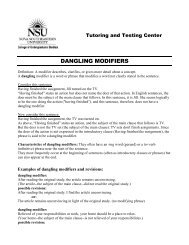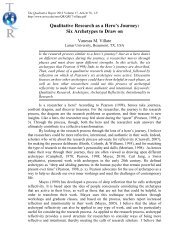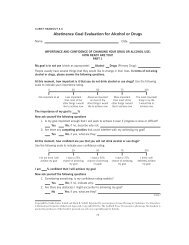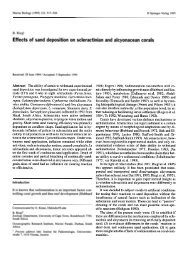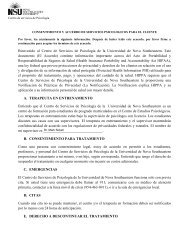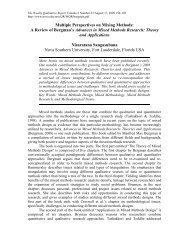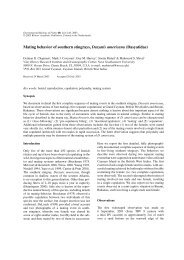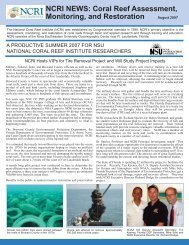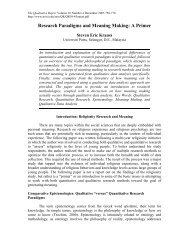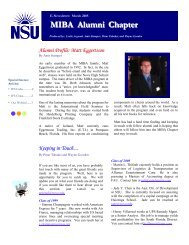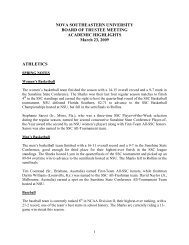Contextualizing Theories and Practices of Bricolage Research
Contextualizing Theories and Practices of Bricolage Research
Contextualizing Theories and Practices of Bricolage Research
Create successful ePaper yourself
Turn your PDF publications into a flip-book with our unique Google optimized e-Paper software.
8 The Qualitative Report 2012<br />
articulation <strong>of</strong> bricolage “onto the next level” (p. 323), by adopting <strong>and</strong> extending the five<br />
categories <strong>of</strong> bricoleurs. For Kincheloe, the criticalization <strong>of</strong> inquiry includes:<br />
1. A move away from positivist <strong>and</strong> monological research approaches that reinforce<br />
oppressive, marginalizing, <strong>and</strong> violent social structures;<br />
2. An embrace <strong>of</strong> research pursuits that appreciate the complexity <strong>of</strong> the lived world<br />
(this includes inquiry processes that do not study objects as detached “things-inthemselves,”<br />
but rather as connected “objects-in-the-world”); <strong>and</strong> finally,<br />
3. A move toward emancipatory research approaches based on critical theories, <strong>and</strong><br />
interdisciplinary/postmodernist/poststructuralist epistemological rationalities.<br />
(Kincheloe, 2005a, 2005b, 2005c)<br />
Whereas Levi-Strauss’ evocation <strong>of</strong> the bricolage metaphor is based on structuralist<br />
foundations, Kincheloe’s theories are grounded in post-structuralist critical philosophies.<br />
Specifically, Kincheloe’s methodological approach holistically explore’s the role <strong>of</strong><br />
discourses, ideologies <strong>and</strong> power in shaping phenomena. In such a context, bricoleurs not<br />
only seek to develop complex underst<strong>and</strong>ings <strong>of</strong> a phenomenon (e.g., an underst<strong>and</strong>ing <strong>of</strong><br />
the multiplicity <strong>of</strong> ways phenomena can be interpreted), they aim to disrupt imbalances <strong>of</strong><br />
power, social injustice, marginalization, <strong>and</strong> oppression perpetrated through traditional<br />
meaning-making practices.<br />
In the following discussion, I draw on various works to contextualize <strong>and</strong><br />
articulate Kincheloe’s conceptualization <strong>of</strong> bricolage as a critical research praxis. While<br />
my focus is on Kincheloe’s texts, I continue to draw on the scholarship <strong>and</strong> research <strong>of</strong><br />
others, (e.g., Berry, 2004a; 2004b; 2006; 2011; McLean, 2008; Watt, 2008; 2011), who<br />
theorize or adopt bricolage approaches (or similar processes) in their works. This<br />
intersection enables me to theoretically situate Kincheloe’s bricolage while also exploring<br />
concrete examples <strong>of</strong> what the approach looks like in research contexts.<br />
Challenging Positivist Paradigms<br />
Kincheloe’s bricolage exists as a critical response to positivist research. The<br />
epistemological basis <strong>of</strong> positivism suggests that knowledge <strong>of</strong> the world is obtainable<br />
only through the objective scientific examination <strong>of</strong> empirical facts. Positivism proceeds<br />
on an assumption that scientific research will lead to the development <strong>of</strong> an<br />
underst<strong>and</strong>ing <strong>of</strong> world, <strong>and</strong> human interaction, in “concrete <strong>and</strong> universal terms”<br />
(Hyslop-Margison & Naseem, 2007, p. 15). Berry (2006) refers to positivist research as<br />
being highly formalized. She explains that, like a medical procedure, "positivistic <strong>and</strong><br />
other traditional research designs tend to work with the singular, linear, step-by-step<br />
structure" (p. 89). These strict positivist methods, like those <strong>of</strong> a metaphorical meaningmaking<br />
“engineer” in Levi-Strauss’s Savage Mind (1966), uncover “truths” about the<br />
social universe that exist independently <strong>of</strong> humans. However, for Kincheloe, human<br />
knowledge construction does not lead to universal “truths” nor can it be considered a<br />
linear or tidy process.<br />
Knowledge production in a positivist paradigm is only possible if researchers use<br />
the "correct" methods to collect information <strong>and</strong> observe the world. Kincheloe sees these<br />
approaches as monologic -- the knowledge is produced through singular methods <strong>and</strong>



